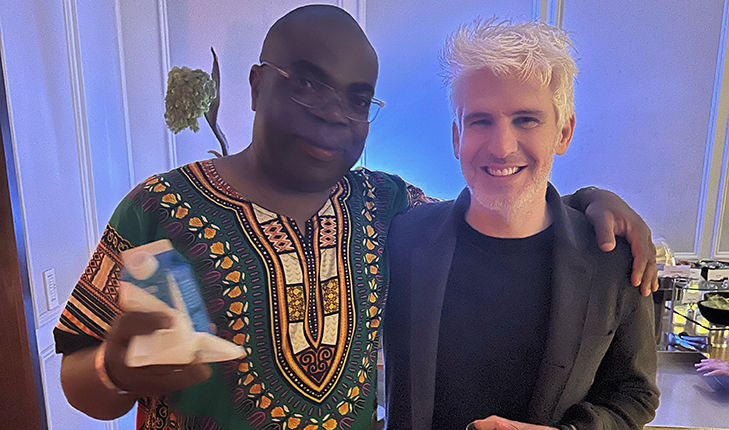
Fresno State professor Dr. Michael Onyebuchi Eze.
The philosophy of Ubuntu, the African form of wisdom that emphasizes interconnectedness and community as a way of life, has reached a wider audience thanks to Fresno State Africana studies professor and philosopher Dr. Michael Onyebuchi Eze’s appearance on Max Joseph’s “Happiness” docuseries on YouTube.
Eze makes an appearance on the third episode of the series titled “Happiness: The Philosophical Secret to Happiness.”
The series centers on Joseph’s (pictured above) journey to learn how and what it means to be happy. Episodes are about 20 minutes long and take Joseph around the world visiting multiple locations, including Fresno State’s campus.
“The filmmakers came over to Fresno State for my own episode and with the support of the dean of [the College of] Social Sciences, Dr. Elizabeth Lowham, it was a day of laughter, joy and happiness,” Eze said.
Eze lends his expertise on the subject of Ubuntu to the series. The Ubuntu proverb focuses on interconnectedness and community, how a person is a person through other people.
“It says, ‘I am because you are; since you are, therefore I am,’ and this includes not only humans but also, plants, animals, seas, the living, the unborn and the departed,” Eze said.
According to the documentary, the Ubuntu philosophy defines happiness differently than the widely known European psychological perspective.
In western philosophy a key pillar of happiness is ‘finding our purpose” or “self-actualizing” as described by Abraham Maslow in his theory of the hierarchy of human needs.
In Maslow’s hierarchy of needs, a person works their way through a pyramid, with our physical needs such as food, water and rest at the bottom, followed by needs like security and safety, belonging and love, a need for intimate relationships and friends, and esteem needs. Once all those needs are met a person is able to “self-actualize.”
However, as writer and journalist Jill Filipovic points out, not everyone has the same support to self-actualize in the way Maslow described. The reality for many women in society is that there “is no support” for women to find the time to self-actualize.
“I think we saw this during the COVID-19 pandemic when it became really, really clear that America’s backup plan for pretty much everything was overwhelmingly mothers,” Flipavic is quoted as saying in the documentary.
During the pandemic, mothers were mostly in charge of childcare, teaching and taking care of the home. When women are expected to take on the brunt of childcare and simultaneously to work outside the home, it leaves little time to “pursue knowledge” or “chase meaning.” To put it in terms of Maslow’s hierarchy of needs, Flipivic points out, in western culture women are tasked with the burden to carry the bottom part of the pyramid for others, leaving them little time to seek knowledge and self-actualize as individuals themselves.
Under western philosophy it would seem self-actualization is dependent on the time, access and resources the individual has.
Whereas Ubuntu focuses on the self-actualization of the collective.
“Maslow speaks from a specific European historical tradition. ‘I am what I have’,” Eze said in the documentary. “Your story, who you are, how you’re seen in society, is dependent on your status, on your possessive-ism, on your network and that is problematic.”
In applying the wisdom of Ubuntu, Eze said happiness is focused more on community and its interconnectedness.
“During the conversation, what stood out for me was that happiness is necessarily a journey of self-discovery. In African philosophy we speak of happiness as a collective joy. It is not about what you have, but who you are irrespective of your status in life,” Eze said.
Dr. Jennifer Randles, interim associate dean of the College of Social Sciences at Fresno State, said learning a wide range of global perspectives teaches students to think clearly, critically and analytically.
Randles pointed to the mission of the college which states it, “fosters respect for human diversity and a sense of responsibility for the enlightened stewardship of the ecosystems of which we are a part. Thus, we endeavor to prepare students to adapt both wisely and resourcefully to the ever-changing world.”
In advancing students’ knowledge of societies and cultures, she said they gain a global awareness, understanding and appreciation of different backgrounds, which is an essential skill for engaging in solutions to complex social problems.
“Many of our programs teach about our interconnectedness, obligations to one another, and promoting the social good and community uplift,” Randles said. “The Ubuntu philosophy seems to align with that, that we’re part of something greater than just ourselves, and that only through our social relationships with one another, do we generate meaning, value and dignity.”
To Eze, who joined the College of Social Sciences in 2023 and now teaches numerous classes that address these themes of interconnectedness and social value, happiness is a discovery that “we are all bound together in a shared humanity and that difference is a gift and not a threat.”





